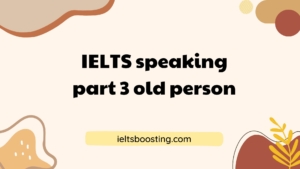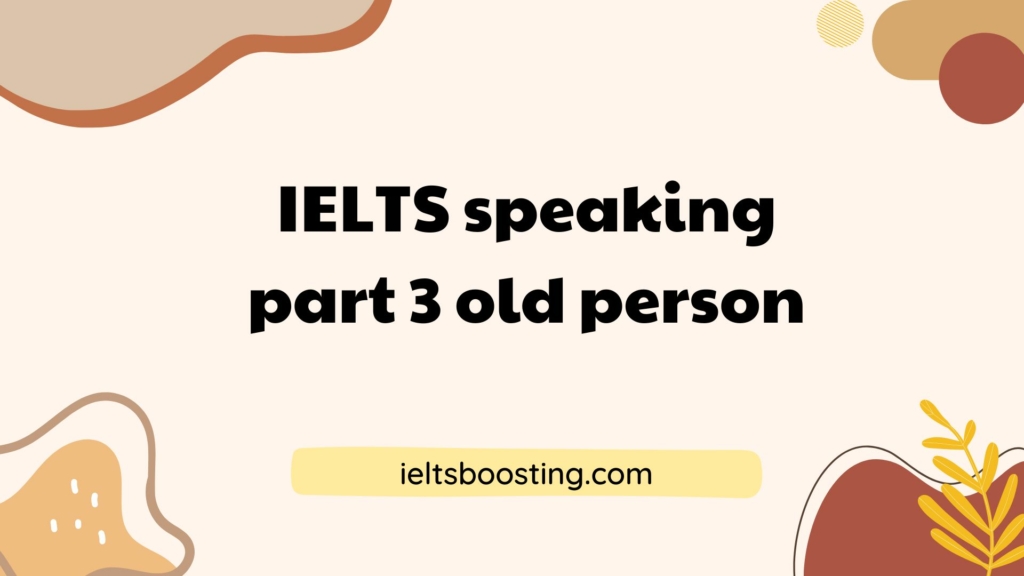ielts speaking part 3 old person
What are the advantages of having an elderly person at home?
Having an elderly person at home offers a myriad of advantages. Firstly, they provide invaluable companionship and emotional support, which is especially beneficial for younger family members. The intergenerational exchange of wisdom and experience becomes a rich source of learning, enabling the passing down of valuable life skills and traditions. Additionally, they can assist their children, who may be busy with jobs, in taking care of their grandchildren and managing household responsibilities.
Some useful vocabulary :
- companionship: the feeling of having or being a friend
- emotional support: the act of showing care and concern for someone who is going through a difficult time
- wisdom: the quality of having good judgment and knowledge based on experience
- experience: the knowledge and skills that you gain from doing something for a long time
Is there anything that older people should learn from the younger generation?
Yes, of course. Older people should learn from the younger generation about the latest trends and technologies that are changing the world rapidly. The younger generation can help the older generation to adapt to the new environment and to stay connected with their friends and family through social media and online platforms. The younger generation can also inspire the older generation to be more creative and innovative in their hobbies and interests, and to enjoy life with a positive attitude.
Some useful vocabulary :
- latest trends and technologies: the most recent or popular developments and innovations in various fields, such as fashion, music, science, etc.
- adapt to the new environment: to adjust or change one’s behavior or attitude to fit in with a different or changing situation or context
- stay connected: to maintain or establish contact or communication with someone or something, especially through the internet or phone
- be more creative and innovative: to use one’s imagination and originality to produce or invent something new or different
- enjoy life: to have fun and pleasure in one’s existence or activities
What can the younger generation learn from the older generation?
The younger generation can learn a lot from the older generation, such as their wisdom, values, and life experiences. The older generation has gone through many challenges and successes in their lives, and they can offer valuable advice and guidance to the younger generation. The younger generation can also learn about the history and culture of their ancestors from the older generation, and appreciate the changes and developments that have occurred over time.
Some useful vocabulary:
- wisdom: the quality of having good judgment and knowledge based on experience
- values: the principles and beliefs that guide one’s behavior and decisions
- life experiences: the events and situations that one has encountered or lived through in their life
- advice: an opinion or suggestion about what someone should do in a certain situation
- guidance: the act of helping or directing someone to achieve a goal or solve a problem
- history: the study of past events and their causes and effects
- culture: the customs, traditions, arts, and beliefs of a particular group of people
- ancestors: the people from whom one is descended, such as parents, grandparents, etc.

ielts speaking part 3 old person
What qualities does a person need to take care of old people?
A person who takes care of old people needs to have compassion, patience, and communication skills. Compassion means the ability to empathize with the elderly and understand their feelings and needs. Patience means the ability to tolerate and cope with the challenges and difficulties that may arise when caring for the elderly, such as their physical or mental decline, their forgetfulness, or their mood swings. Communication skills mean the ability to express oneself clearly and listen attentively to the elderly, as well as to use appropriate language and tone when interacting with them.
Some useful vocabulary:
- compassion: the feeling of sympathy and concern for the suffering or well-being of others
- patience: the capacity to accept or tolerate delay, trouble, or suffering without getting angry or upset
- communication skills: the ability to convey or exchange information effectively and appropriately
- empathize: to share and understand the feelings of another person
- decline: a gradual and continuous loss of strength, quality, or value
- forgetfulness: the tendency or habit of forgetting things
- mood swings: sudden and extreme changes in one’s emotional state
- interact: to communicate or act together with someone or something
Do you think elderly people should be allowed to work?
I think elderly people should be allowed to work if they want to and if they are capable of doing their job. There are many benefits of working for older people, such as maintaining their physical and mental health, contributing to the society and the economy, and fulfilling their personal goals and interests. However, there are also some challenges and risks that elderly workers may face, such as discrimination, exploitation, or injury. Therefore, I think there should be some regulations and protections for elderly workers, such as flexible hours, fair wages, and safe working conditions.
Some useful vocabulary:
- benefit: an advantage or a good result that comes from doing something
- maintain: to keep something in good condition or at a certain level
- contribute: to give something, especially money, time, or effort, to help achieve or provide something
- fulfill: to do or achieve something that you have promised or wished for
- challenge: a difficult task or problem that tests your ability or skill
- discrimination: the unfair treatment of someone based on their age, gender, race, etc.
- exploitation: the act of using someone unfairly for your own advantage or benefit
- injury: harm or damage to someone’s body caused by an accident or violence
- regulation: a rule or law that controls or limits something
- protection: the act of keeping someone or something safe from harm or danger
- flexible: able to change or adapt to different situations or needs
Do you think that elderly people should be taken care of at home?
I believe that elderly people should be taken care of at home if possible because it is more comfortable and familiar for them. Being close to their family and friends allows them to enjoy their daily routines and hobbies. Moreover, staying at home provides many opportunities for them to play and talk with their offspring, bringing them much happiness.
Some useful vocabulary :
- comfortable: feeling relaxed and free from pain or stress
- familiar: well-known or easily recognized
- challenging: difficult or demanding, requiring effort or skill
- stressful: causing or feeling mental or emotional strain or tension
- professional: having the skills, qualifications, or experience that are required for a certain job or activity
Why do old people today live longer than in the past?
Old people today live longer than in the past because of the improvements in living standards and healthcare. Living standards refer to the quality of life that people have, such as their income, education, nutrition, and sanitation. Healthcare refers to the services and products that prevent and treat diseases and injuries, such as vaccines, antibiotics, and hospitals. These factors have reduced the mortality rates from infectious diseases, malnutrition, and accidents, and increased the life expectancy of people around the world.
Some useful vocabulary:
- living standards: the quality of life that people have, such as their income, education, nutrition, and sanitation
- healthcare: the services and products that prevent and treat diseases and injuries, such as vaccines, antibiotics, and hospitals
- mortality rates: the number of deaths in a population or group, usually expressed as a percentage or a ratio
- infectious diseases: diseases that are caused by microorganisms, such as bacteria, viruses, and parasites, and can be transmitted from one person to another
- malnutrition: the condition of not having enough or the right kind of food to maintain good health
- life expectancy: the average number of years that a person can expect to live, based on the statistics of their population or group


